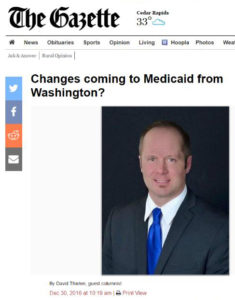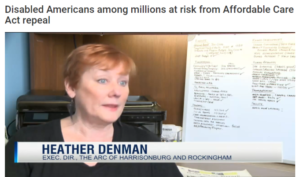The Arc on House Health Care Bill: “Medicaid Will Be Decimated”
Washington, DC – The Arc released the following statement on the draft legislation that repeals the Affordable Care Act (ACA) and pays for it by decimating Medicaid, a program critical to the lives of people with intellectual and developmental disabilities:
“This legislation ends Medicaid as we know it. If it is enacted, Medicaid will no longer be a state and federal partnership – the federal government will cap what it provides, leaving the states to pick up the pieces. It will have a dire impact on the lives of people with intellectual and developmental disabilities who rely on Medicaid and the Affordable Care Act for their health care, community supports, and as a way to live independently in their communities.
“Thanks to the Medicaid expansion under the Affordable Care Act, millions of people, including people with disabilities, their family members, and their support professionals, have gained access to health coverage. Lives have been saved because people have had access to affordable, comprehensive health coverage. The tax credits and changes to health savings accounts proposed in this bill are not adequate to meet needs of people with intellectual and developmental disabilities or those with chronic health conditions. And we have no idea how much this approach will cost, or how many people will lose coverage as Congress is rushing this bill through before the budget experts can do the math on the price tag in dollars and impact on lives.
“The bottom line is that under this legislation, Medicaid will be decimated. People will lose vital benefits and services that support their basic human right to a life in the community. It will turn back the clock on the progress we have made as a society over the last 65 years. It’s morally reprehensible, and our nation cannot let this happen,” said Peter Berns, CEO of The Arc.
The Arc advocates for and serves people with intellectual and developmental disabilities (IDD), including Down syndrome, autism, Fetal Alcohol Spectrum Disorders, cerebral palsy and other diagnoses. The Arc has a network of over 650 chapters across the country promoting and protecting the human rights of people with IDD and actively supporting their full inclusion and participation in the community throughout their lifetimes and without regard to diagnosis.


 David Thielen, CEO of The Arc of East Central Iowa, had a
David Thielen, CEO of The Arc of East Central Iowa, had a  Heather Denman, Executive Director of The Arc of Harrison and Rockingham, appeared in a
Heather Denman, Executive Director of The Arc of Harrison and Rockingham, appeared in a 





